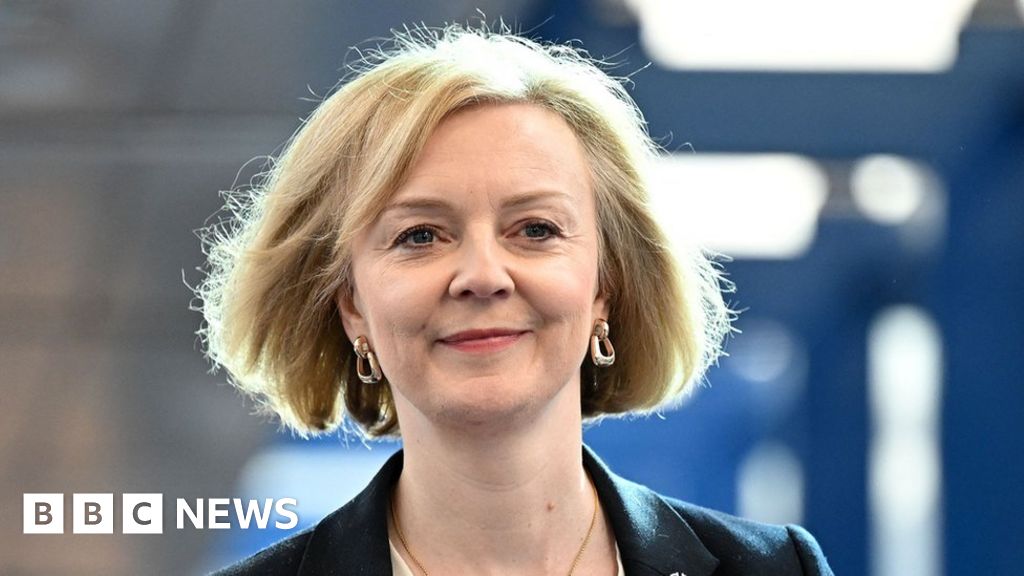This video can not be played
To play this video you need to enable JavaScript in your browser.
Liz Truss is coming under pressure from Tory MPs to ensure benefits rise in line with prices, with minister Penny Mordaunt arguing it “makes sense”.
Former PM Boris Johnson pledged benefits would rise with inflation.
Ms Truss has refused to say she would maintain the commitment, as she faces questions over how to pay for her government’s tax-cutting plans.
The PM told the BBC a decision hadn’t yet been made, as the issue dominated Tory party conference in Birmingham.
Speaking to Times Radio, Ms Mordaunt said: “We want to make sure that people are looked after and that people can pay their bills. We are not about trying to help people with one hand and take away with another.”
Asked if she welcomed Ms Mordaunt making her views public, Ms Truss said: “I look forward to having those discussions.”
Chancellor Kwasi Kwarteng said he would not “get drawn into the debate”, but stressed his attachment to “compassionate conservatism”; while Work and Pensions Secretary Chloe Smith would not be drawn.
Welsh Secretary Robert Buckland, asked by BBC Newsnight if he wanted to see benefits rise in line with inflation, said: “Every Conservative government that I’ve been part of has maintained the safety net, and I’m sure this one will do the same.”
Certain benefits, including disability benefits and carer’s allowance, must increase in line with inflation by law.
This video can not be played
To play this video you need to enable JavaScript in your browser.
However, for working-age benefits like universal credit no decision has yet been made on whether a rise will be linked to prices or wages.
Questions about the government’s policy on benefits come during a difficult week for the prime minister.
On Monday, Ms Truss’s authority took a blow when she was forced by her own MPs to U-turn on her plan to reduce tax for higher earners.
Speaking in her first BBC interview since the U-turn, Ms Truss reiterated that the government could have laid the groundwork better for the measure.
She said the government was listening and did “reflect on where we could have done things better” but said the top income tax rate had not been a “core part” of her economic growth package.
The PM is facing opposition from some Tory MPs over how the government will pay for its growth package.
Chancellor Kwasi Kwarteng’s tax-cutting mini-budget on 23 September saw the pound’s value plummet, borrowing costs soar, and the Bank of England bail out pension funds.
This video can not be played
To play this video you need to enable JavaScript in your browser.
Asked about whether she would commit to increasing benefits in line with inflation, Ms Truss told the BBC: “We are going to have to make decisions about how we bring back down debt as a proportion of GDP in the medium term.”
She added that she was “very committed to supporting the most vulnerable”, including providing an extra £1,200 to the poorest households.
“So we have to look at these issues in the round. We have to be fiscally responsible.”
In May this year, then-chancellor Rishi Sunak said benefits would be uprated by this September’s Consumer Prices Index measure of inflation, which is currently 9.9%, subject to a review by the work and pensions secretary.
Mr Kwarteng has declined to commit to the policy, though the government has pledged to increase state pension contributions in line with inflation.
Failing to keep benefits in line with rising prices would leave some of the poorest households facing a real-terms cut in their incomes.
Mel Stride, who chairs the Commons Treasury Committee, said he “would have to think long and hard” about whether to vote for uprating benefits in line with wages instead because of the “strong real-terms squeeze on those benefits already”.
And former work and pensions secretary Damian Green told the BBC the policy would “probably not” get through the Commons.
However, Tory MP Lee Anderson said it “does not seem fair” for those on benefits to get “inflation-busting” increases of as much as 10%, while public and private sector workers are offered pay rises of 2-4%.
Meanwhile, former home secretary Priti Patel accused the government of “spending today with no thought for tomorrow” at a fringe event at the Conservative Party Conference.
Labour’s shadow chancellor Rachel Reeves criticised the lack of commitment to the move, saying: “The idea that the government can afford to give tax cuts to the wealthiest, but not uprate benefits in line with inflation, I think is grotesque.”
Tuesday also saw confirmation the chancellor would bring forward his medium-term fiscal plan, which will outline how the government plans to cut the UK’s debt, “shortly” rather than at the end of November.
Ms Truss was asked several times whether she trusted her chancellor following the U-turn.
Sidestepping the question, she said: “I work very, very closely with my chancellor, we’re very focused on getting the economy growing.”

Are you affected by the issues in this story? Share your experiences by emailing haveyoursay@bbc.co.uk.
Please include a contact number if you are willing to speak to a BBC journalist. You can also get in touch in the following ways:
- WhatsApp: +44 7756 165803
- Tweet: @BBC_HaveYourSay
- Upload pictures or video
- Please read our terms & conditions and privacy policy
If you are reading this page and can’t see the form you will need to visit the mobile version of the BBC website to submit your question or comment or you can email us at HaveYourSay@bbc.co.uk. Please include your name, age and location with any submission.
